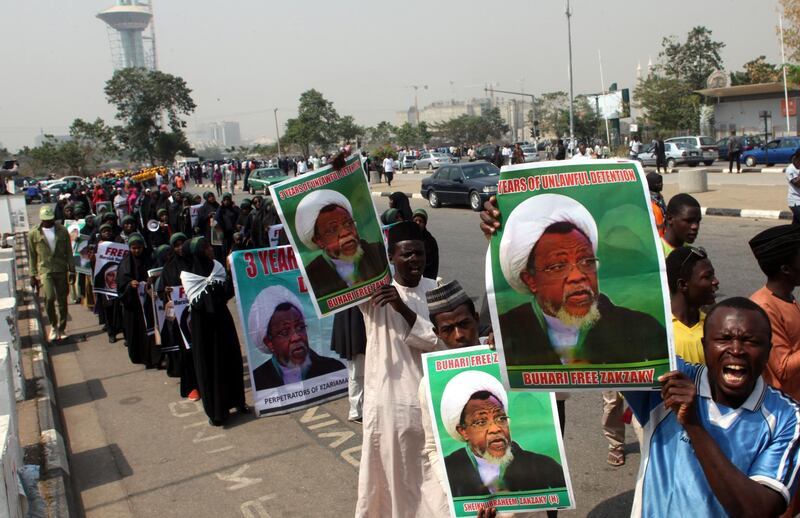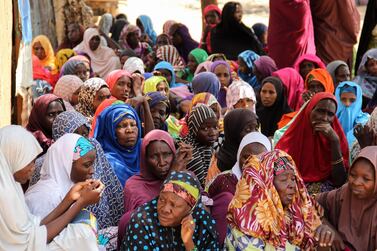A leader of an outlawed group in Nigeria has vowed that protests will continue, despite the death of hundreds of its supporters, after the government listed the Islamic Movement of Nigeria as a terrorist organisation.
Nigeria’s presidency announced on Sunday that it had banned the movement and secured a court ruling calling it a terrorist group.
The ban comes after violent protests in Abuja last Monday by supporters demanding the release of their imprisoned leader, Ibrahim Zakzaky.
At least 20 people were killed by gunfire, including many members of the group, a trainee journalist and a high-ranking police officer.
Member Abdulhamid Bello told The National his group rejected the terrorist designation and would continue campaigning for the release of Mr Zakzaky, who has been in custody since December 2015 with his wife Zeenah Ibrahim.
“The court ruling is something we’ve been expecting," Mr Bello said. "They know we’re not a terror group. Let them not begin to say they can ban a concept or an ideology.
“The constitution of Nigeria allows everybody to protest. There will be continued protests until his release.”
The protests have intensified recently over concerns about Mr Zakzaky's failing health. Mr Bello saying he was admitted to hospital last Tuesday.
Mr Zakzaky has a bullet lodged in his brain from a shooting during his arrest nearly four years ago.
“Allowing our leader to die in custody will amount to something very detrimental,” Mr Bello said.
“That’s why we’re putting pressure on the government to allow him seek treatment for his health.”
On Monday, a court adjourned a bail hearing for Mr Zakzaky until August 5.
The government’s treatment of the group could result in more violence, said Tunde Leye, an analyst at risk advisory SBM Intelligence.
Mr Leye said this was something Africa’s most populous country could ill-afford, given its current struggles to contain Boko Haram and frequent clashes between farmers and itinerant herdsmen.
Nigeria has about 85 million Muslims, mainly in the north of the country.
The group formed in the 1970s as a student movement inspired by the Iranian revolution.
Mr Zakzaky, 66, has led it since its inception in the northern city of Zaria . Estimates suggest there are between 4 and 10 million Shiite Muslims in Nigeria, with the group said to have almost 3 million followers.
Mr Zakzaky has called for a revolution to create an Islamic state in Nigeria, an end to western influence and the adoption of Sharia.
The group's supporters have clashed frequently with the secular Nigerian government.
Tension with the government of President Muhammadu Buhari have increased since Mr Zakzaky’s detention.
There are differing accounts of the December 2015 events that led to the arrest of Mr Zakzaky after the military accused him of orchestrating an attempted assassination of its top chief in Zaria. The group said the army then attacked its religious centre.
After initial clashes, the army sent soldiers to various locations in Zaria, arrested Mr Zakzaky, and destroyed his home and spiritual centre after a night of heavy gunfire.
More than 350 members of the sect were killed, a judicial inquiry found in a report calling for the prosecution of the soldiers who took part in the killings.
But the prosecution has yet to happen. Instead, Mr Zakzaky and his wife have remained in prison despite a federal high court ordering his release in 2016.
The Nigerian government has disregarded the order and filed new charges including homicide against him.
A presidential spokesman said Mr Zakzaky was detained for "his own safety."
The government insists the listing of the IMN is not aimed at discriminating against Nigerian Shiite Muslims.
"Proscription of Islamic Movement of Nigeria has nothing to do with banning the larger numbers of peaceful and law-abiding Shiites in the country from practising their religion," the presidency said.
"Instead it was to discourage wanton violence, murder and wilful destruction of public and private property."
Mr Bello disputed the claim that Mr Zakzaky was being held for his safety.
“How can you protect somebody against his wishes?” he asked.
Protests by the sect have often been met with deadly force by security agencies.
Last October, at least 45 members were killed by security forces as they held peaceful processions, Amnesty International said.
Mr Bello says the group's members are undaunted by a ban he calls “wicked”.
But with Mr Zakzaky’s incarceration and declining health, Mr Leye says radical elements of the sect could seize power or split off to take up arms, as happened with terror group Boko Haram.
Boko Haram has killed thousands and kidnapped others since the extrajudicial killing of its leader Mohammed Yusuf in police custody in Maiduguri in 2009.
Mr Bello, however, says the group will not turn to terrorism.
"We have our own ideology and our ideology differs from what they allege us to be," he said.
"We will continue the way we are. We’ve been in existence for more than 40 years. They cannot allege that we should become Boko Haram.”






